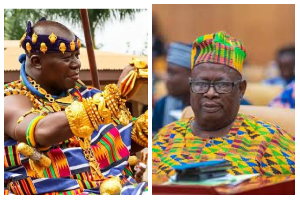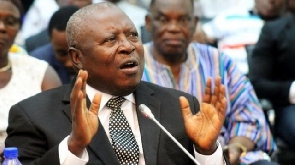(Islamic Terrorism And Slavery Controversy: A Corrective?Part l)
“Throughout history, it has been the inaction of those who could have acted, the indifference of those who should have known better, the silence of the voice of justice when it mattered most, that has made it possible for evil to triumph (Haile Selassie).”
That is a bold expression of sheer rhetorical power by a visionary tongue! On the other hand, it is interesting to note how the unfortunate passing of Prof. Kofi Awoonor has generated many discussions centered primarily on the topic of national security vis-a-vis religious terrorism, particularly of Islamic terrorism, in Ghana and elsewhere in Africa. In the meantime, some readers have already begun to question the social and political utility and wisdom, even the morality, of excavating or in exercising the hegemony of a 200-year-old intellectual archeology on the epidemiology of Christian (and Islamic) violent “incursions” into xenophilous Africa.
For all intents and purposes, we don’t question readers with this mindset. After all, we are all entitled to our personal and collective opinions. Here is the moral surprise, however: “Everyone is entitled to his own opinion, but not to his facts!” said Daniel Patrick Moynihan. We must do well to bear this wisdom in mind. In fact, history and historiography, that‘s, non-partisan, de-politicalized, de-ethnicized body of knowledge (we employ these terms in relative contexts) solve many problems in societies willing to submit their national consciences to the moral authority of the lumbering past. Yet we tip our hat to the contrarian power of Voltaire’s statement: “History consists of a series of accumulated imaginative inventions.”
In fact, we as a people have not sufficiently addressed the historical (and contemporary) injustices we have suffered at the hands of foreigners and even of ourselves. For instance, the seemingly unending conflicts in the Eastern Congo (See Adam Hochschild’s “King Leopold’s Ghost”), the Rwandan Genocide, and Arab racism in the Sudan and Mauritania (as well as in Mali, Chad, etc), to name but four, immediately come to mind. On the other hand, the international organization “Friends of the Congo” and the American feminist Eve Ensler, author of the controversial “The Vagina Monologues,” have exposed the Conradian horrors of the Congo to the world. Characteristically, Ensler has even referred to the horrors Congolese women face as “Femicide in the Congo.”
Ironically, these pundic atrocities have their deep phallic roots in the nymphomaniac Kiplingian soil of European colonialism and American-USSR neocolonialism. However, in Western Europe, the British constitutional historian, Dr. David Starkey, is quick to blame social anarchies in Britain primarily on black folks though communal collaborations have been between blacks and whites. Cultural and biological blackness, it seems, is despised everywhere, interestingly, even in the African world, continental and diasporic, by both blackness and whiteness! We need to talk about this!
Do we think Kufour’s National Reconciliation Commission sufficiently addressed all of Ghana’s social, historical, and political wrongs? Talk to the victims whose relatives tasted the brutality of our military! Even Mandela’s and Tutu’s Truth and Reconciliation Commission failed in its moral obligation to adequately address the shameful legacy of Apartheid. “Although Soyinka respects the generosity of spirit behind South Africa’s Truth and Reconciliation Commission, he points out that the failure to demand restitution may build an expectation of impunity that can only further crimes,” writes a reviewer of Soyinka’s book “The Burden of Memory, the Muse of Forgiveness.”
This is the major problem those readers of our articles who are certainly averse to the material and psychological essentialization of history/historiography fail to see! It takes a lot to forgive as Kwabena Agyei Agyapong did (My own uncle, Air Vice Yaw Boakye, faced the wrath of the firing squad! But getting everybody along as we develop Ghana and Africa is my ultimate objective in life). Not everyone can. “Yes, I was angry!” Mandela said in response to Bill Clinton’s question “But tell me the truth. Weren’t you angry all over again?” “And I was a little afraid. After all, I’ve not been free in so long,” Mandela continued, adding: “When I felt that anger well up inside me I realized that if I hated them after I got outside that gate they would still have me. I wanted to be free so I let go.” This is moral leadership, something we must teach the youth! “It was an astonishing moment in my life. It changed me,” Bill Clinton later remarked.
Wole Soyinka was predictably correct. Now, see the level of inter-racial tension, intra-black hatred, and impunity in post-Apartheid South Africa. The Marikana Massacre, for instance, is a direct throwback to some of the “unfortunate” post-Apartheid policy decisions made by the moral pillar of racial justice, Rolihlahla Mandela himself! Moreover, Jimmy Carter, like Soyinka, foresaw as well as witnessed a similar situation brewing in the so-called Middle East and wrote “Palestine: Peace Not Apartheid” to question Israel’s political immorality in the institutionalization of Apartheid in the Middle East, Israel specifically.
However, depending on how history and historiography both are used, they can either be the cause of social, psychological, national, and political ills or be the creative medicine for those very same ills. Are we not here because our parents were here before us? And are our parents not here because their parents, our grandparents, were here before them? Who says historiography and history have no palliative psychosocial value in healing wronged communities of nations, ethnicities, races, friendships, romance, death, marriages, and even life? Don’t underestimate the moral power of “true” historical/historiographic knowledge!
The Armenian Genocide is a typical example. The Turkish government and its historians say it did not happen. On the other hand, the French government, its historians, as well as Armenians and Armenian surviving victims say it did in fact happen. Following the French, the US Congress had wanted to attach legal muscularity to the Armenian Genocide but could not generate a quorum to effectuate passage of the bill. Yet, despite forest of bones collected in Kigali Genocide Memorial Center, a place Paul Wolfowitz and other world leaders had visited, to show the world, some Hutu militants and historians stubbornly maintain the Rwandan Genocide did not take place! Interestingly, the French openly admit to the Armenian Genocide taking place but refuse to make public legislative pronouncements in its role in enslaving Africans!
Let’s remind ourselves again that history and historiography have the potential to lead us to the moral path of inter-ethnic reconciliation, national cohesion, inter-racial and intra-African harmonies. Genocide history/historiography is why American Jews have littered the sociopolitical face of America with Holocaust Museums though the Holocaust itself occurred in Europe (Germany), not in America (See Norman Finkelstein’s “Holocaust Industry: Reflections on the Exploitation of Jewish Suffering”; see also Lenni Brenner’s 51 “Documents: Zionist Collaboration with the Nazis” and Edwin Black’s “The Transfer Agreement: The Dramatic Story of the Pact Between the Third Reich and Jewish Palestine).
However, African Americans whose shredded humanity, slavery, sweat, and suffering built America have yet to receive a single Holocaust Museum on behalf of their industrious and forgiving ancestors. Native Americans whose land was forcibly stolen from them and then consigned to reservations are also yet to receive a Holocaust Museum on behalf of their generous and hospitable ancestors. Could those readers of ours do us the honor and favor of telling Jews to stop disturbing the quiet of humanity by not talking about things that happened to them 5000 years ago? If their answer falls within the uncomfortable sphere of claustrophobic disaffirmation, then, we may be forced to ask: Why Africa? Do we recall Ota Benga, a Twa (formerly referred to derogatively as “Pigmy”), was kept on display with monkeys in New York’s Bronze Zoo, in the section referred to as “The Monkey House”?
Finally, some readers have also raised the issue of American and European Abolitionists who died trying to bring slavery to an end. Yet Abolitionism did not start with white folks in either America or Europe. Theirs was a relatively recent phenomenon. Interestingly, there were nearly 300 wars which Africans fought across the continent to undermine the institutional legitimacy of slavery (See the works of the British historian Basil Davidson”). We must not allow others to take all the historical credits! There were white Abolitionists and many of their immediate family members who, after all, owned slaves themselves.
But here is the problem: These facts about African Abolitionism are not taught in Western schools. We Africans don’t even acknowledge it, let alone teach it in our schools. In fact, if we did, no reader would have praised White Abolitionists, leaving out their African counterparts whose active Abolitionism predated the West’s. What Yaa Asantewaa and others did formed part of the long historical geography of African Abolitionism. We must not forget Chaka the Zulu though some White academics and anonymous Western sources have alleged he collaborated with white colonialists. These sources have also alleged he was also a homosexual. We’re yet to confirm or disconfirm these allegations!
After all, who initiated the so-called Transatlantic Slave Trade? “First, we must get the terms of the argument straight. There’s no African Slave Trade, no Transatlantic Slave Trade; there’s only European Slave Trade across the ocean as there is the Arab Slave Trade across the desert. I say European Slave Trade because the motive for kidnapping and transporting Africans across the ocean was a European initiative,” writes Asante in “Henry Louis Gates is Wrong About African Involvement in the Slave Trade.”
Asante’s directed his response at Harvard University Henry Louis Gates, Jr.’s controversial article “Ending the Slavery Blame-Game,” in which Gates writes: “While we are familiar with the role played by the United States and the European colonial powers like Britain, France, Holland, Portugal and Spain, there is little discussion of the role Africans themselves played. And that role, it turns out, was a considerable one, especially for the slave-trading kingdoms of western and central Africa. These included the Akan of the kingdom of Asante in what is now Ghana, the Fon of Dahomey (now Benin), the Mbundu of Ndongo in modern Angola and the Kongo of Today’s Congo, among several others.”
While we acknowledge the fact that Gates did not provide historical/historiographic statistics, if, indeed, he had any, the fact still remains that some Africans (kings, kingdoms, etc) had been implicated in the inhuman trade in human flesh. But the problem for us is the quantum of Africans and other African-oriented historical variables that were actually involved in the commercial enterprise. Arabs, according to Prof. Salahuddin, say only a few of their kind were involved in the Arab Trans-Saharan Slave Trade. Ironically, Westerners, via warped African ideological mouthpieces like Gates’, also are saying the same thing. Africa and Africans are the only morally culpable elements in both trades!
Asante has a few probing questions for us. He writes: “It’s not difficult at all. One only has to ask the questions, ‘Who traveled to Africa in search of captives? Who created an entire industry of shipbuilding, insurance, outfitting of crews and ships, and banking based on the slave trade? Who benefited enormously from the evil and vile project of human kidnapping? What countries held the asiento from the Catholic Church and the King of Spain for regions of Africa used exclusively for capturing Africans? (See “Henry Louis Gates is Wrong About African Involvement in the Slave Trade”).
Let’s leave you with these facts (See Asante’s “Henry Louis Gates is Wrong About African Involvement in the Slave Trade”):
“There are some fundamental facts. First, no African kingdom used slavery as its principal mode of production. Africa has produced no economies based on slavery. It was left to Europe to create a system of slavery where humans were chattel to be sued as tools in the development of wealth.”
“Secondly, in all massive enterprises where there are oppressors and the oppressed there will be collaborators. It’s no secret that some of Africa’s best minds, Fanon, Memmi, Karenga, have isolated incidents of collaboration among victims of oppression. Blacks were police officers in the white minority regime of South Africa but one cannot blame Apartheid on black people. So when Gates claims that Africans were involved in the slave trade one can accept this, but what one cannot accept is that Africans were equally culpable for the slave trade. Nor should one blame the Judenrats (Jewish Councils) of Germany for Nazi atrocities although they often collaborated with the Germans. Indians collaborated with the British colonialists and some Chinese collaborated with the Japanese in occupied China, and while there is no excuse there is certainly explanation for collaboration.”
We shall return with a sequel?“Why The Truth Matters (Islamic Terrorism And Slavery Controversy: A Corrective?Part ll).” Then, we shall take up the controversies generated by Prof. Abubakr Ben Ishmeal Salahuddin’s essay, “Islam and the African People.”
In the meantime, we shall respectfully implore you to continue poring over our article “God, Favoritism, And Terrorism: The Historical Roots and Legacy of Religious Terrorism.” The prequel and sequel are structured to prepare your minds for our intellectual battle with Prof. Salahuddin!
Opinions of Wednesday, 16 October 2013
Columnist: Kwarteng, Francis














